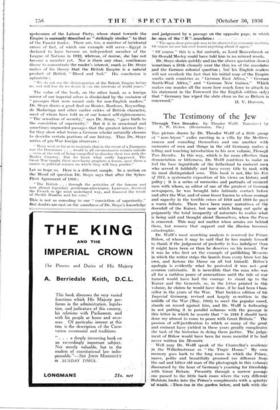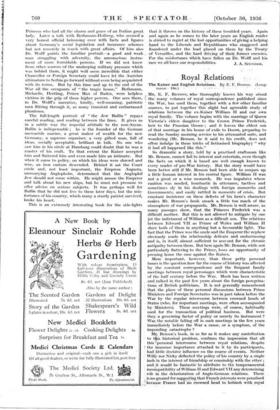The Testimony of the Jew
Tun picture drawn by Dr. Theodor Wolff of a little group of " non-Aryan " exiles meeting in a villa by the Mediterr ranean and consoling themselves and one another with memories of men and things in the old Germany makes 4 telling and touching introduction to his new volume, Throlig4 Two Decades. In this way, which is far more effective than denunciation or bitterness, Dr. Wolff contrives to make ui feel the base ingratitude of the fatherland to eminent mei
• 1::.. its most distinguished sons. This book is not, like his
who served it faithfully and have every title to rank Pit of 1914, a systematic exposition of his views on history and policy ; it is a series of memories and portraits of emit men with whom, as editor of one of the greatest of Genital newspapers, he was brought into intimate contact before and after the War, and of some lesser known to whose courage and sagacity in the terrible crises of 1918 and 1919 he pay4 a .warm tribute. There have been many narratives of t downfall of the Kaiser, but none which bring out quite; poignantly the total incapacity of autocrats to realise whi is being said and thought abontllemselves, when the PresS is. censored. This may not matter when armies are behind them, but remove that support and the_ illusion becomel catastrophic.
_ Dr. Wolff's most searching analysis is reserved for Prince Billow, of whom it may be said that he has mainly himself to thank if the judgement of posterity is less indulgent than it might have been or than he deserves on his record. For it was he who first set the example of publishing Memoirs in which the writer strips the laurels from every brow but. his -own, and fastens the blame on all but himself. Billow's apologia is evidently what he protested it was not—poef Creation raticinatio. It is incredible that the man who was all for a ruthless peace of annexations until the tide of wak turned would have had the courage to stand up to the -Kaiser and the Generals, as, in the letter printed in thi's volume, he claims he would have done, if he had been Chao- cellor in the years of the War. That luckless edition of his
'Imperial Ge., way, revised and largely re-written in the Middle of the War (May, 1916) to meet the popular mood, stands on record against him, and Dr. Wolff is forbearin4 in not putting it in parallel columns with the passage this letter in which he asserts that " in 1916 I should have done my utmost to come to peace with Great Britain." The passion of self-justification to which so many of the great and eminent have yielded in these years greatly complicate the task of the historian in doing them justice. The jud - . ment of Billow would have been far more merciful if he never written his Memoirs. • '-'- -''' - .
Well may Dr. Wolff speak of the Chancellor's residencle in the Wilhelmstrasse as " the Tragic House." My own 'memory goes back to the long room in which the Princt , suave, polite and beautifully groomed (sci different front the sad and bitter old man of the photograph in this volun4) :discoursed by the hour of Germany's yearning for friendship'
„with Great Britain. Presently through a narrow passage :. one passed to the little back- room where the very differeift .-'-floisteili.texokezinto the Prince's compliments with a spluttlr , tit ...tsiiiiii: - ii. Then:lea in ihe .gardea_ below, and . talk with _the Princess who had all_ the charm and grace of an Italian great lady. Later a talk with Betfunann-Hollweg, who seemed a very honest official brimming • over With facts and figures-.
about Germany's social legislation and insurance schemes but not remotely in touch with great affairs. Of him also
Dr. Wolff paints the familiar portrait—a good and weak man struggling with adversity, the unconscious instru- ment of more formidable persons. If we did not know from other sources of the unsleeping military pressure which was behind them,, it might Well seem incredible that either Chancellor or Foreign Secretary could have let the Austrian ultimatum to Serbia go forward without even being acquainted with its terms. But by this time and up to the end of the War all the occupants of " the tragic house," Betlunann, Michaelis, Hertling, Prince Max of Baden, were helpless victims in the grip of these higher powers. One sees them, in Dr. Wolff's narrative, kindly, well-meaning, patriotic men flitting through it, so many transient and embarrassed phantoms.
The full-length portrait of " the Jew Bailin " repays careful reading, and reading between the lines. It gives us in a subtle way the imperial attitude to the non-Aryan. Bailin is indispensable ; he is the founder of the German mercantile marine, a great maker of wealth for the new Germany, a supreme organiser, a very gifted man, Tull of ideas, socially acceptable, brilliant in talk. No one who saw him in his circle at Hamburg could doubt that he was a master of his craft. To that extent the Kaiser accepted him and flattered him and even made him an intimate. But when it came to policy, on which his ideas were shrewd and wise, an iron curtain descended. Behind it sat the Court circle and, not least important, the Empress Augusta, unwearying Anglophobe, determined that the Anglophil Jew should not come within. He might amuse the Emperor and talk about his new ships, but he must not presume to offer advice on serious subjects. It was perhaps well for Baffin that he did not live to these later days, but the mis- fortunes of his country, which many a sturdy patriot survived, broke his heart.
This is an extremely interesting book for the side-lights
that it throws on the history of these troubled years. Again and again as he comes to the later years an English reader is stirred to regret at the kilt opPortnnities of &ink' a helping hand to the Liberals and Republicans who staggered and foundered under the load placed on them by the Treaty of Versailles, and the hard driving of their, former enemies.
For rt J. A. SPENDER.





















































 Previous page
Previous page